Going up? Going down? Or, staying in the same place? Those are the only options to ponder now that it is National Talk In An Elevator Day. The idea is to spark up a quick conversation with a stranger while you level up - or down. So, polish up your pitch and perhaps you will find your way somewhere new? That’s one thought to have on July 29, 2022 and this installment of Charlottesville Community Engagement hopes to get to the bottom of a few things. I’m your host, Sean Tubbs.
On today’s show:
The deadline will soon close to tell the University of Virginia that your company wants to build affordable units as part of a housing initiative
Albemarle Supervisors approve funding to further advance affordable housing projects at Southwood
There’s another algae bloom at Chris Greene Lake
And Albemarle Supervisors deny a request from a landowner next to the lake to import clean fill to help restore the land to raise livestock
First shout-out: Piedmont Master Gardeners want to help you rethink your lawn
In today’s first subscriber supported public service announcement: Want to change up your lawn to something more sustainable for pollinators and other creatures? The Piedmont Master Gardeners wants you to know about a program called Healthy Virginia Lawns which can assist you in your transition. The program is a joint venture of Virginia Cooperative Extension and the Virginia Department of Conservation and Recreation. If interested, the first step will be for a Piedmont Master Gardener to come for a visit for an assessment and soil tests.
Healthy Virginia Lawns will give you a customized, science-based roadmap to a greener landscape that protects water quality, wildlife and other resources along the way. Visit piedmontmastergardeners.org to learn more!
And if you want to learn more about how to use water more efficiently while gardening, Piedmont Master Gardeners are hosting a program at the Center at Belvedere this Tuesday, August 2, at 6:30 p.m. Learn more at thecentercville.org.
Deadline looming for responses to UVA housing initiative
Firms and entities that seek to be part of the University of Virginia’s initiative to build up to 1,500 subsidized housing units have until Tuesday to answer a request for qualifications (RFQ).
The University of Virginia Foundation has announced three sites on which mixed-use developments will be built, and the RFQ is for a 24 acre site on Fontaine Avenue known as Piedmont as well as a two acre site on Wertland Street near the intersection with 10th Street NW.
Two weeks ago, the Foundation put out a list of answers to questions raised at a June 10 pre-proposal conference. (view the answers)
“We expect submissions to provide clear examples of the approach to planning and development on other similar projects managed by the respondent,” reads the response to the first question.
The document states that there have been no discussions with either Albemarle or Charlottesville about potential rezonings that might be necessary for the projects. The Piedmont site is located within Albemarle county and offers about 12 developable acres. The 10th and Wertland site is within Charlottesville close to three apartment buildings that have been constructed in the last ten years on West Main Street.
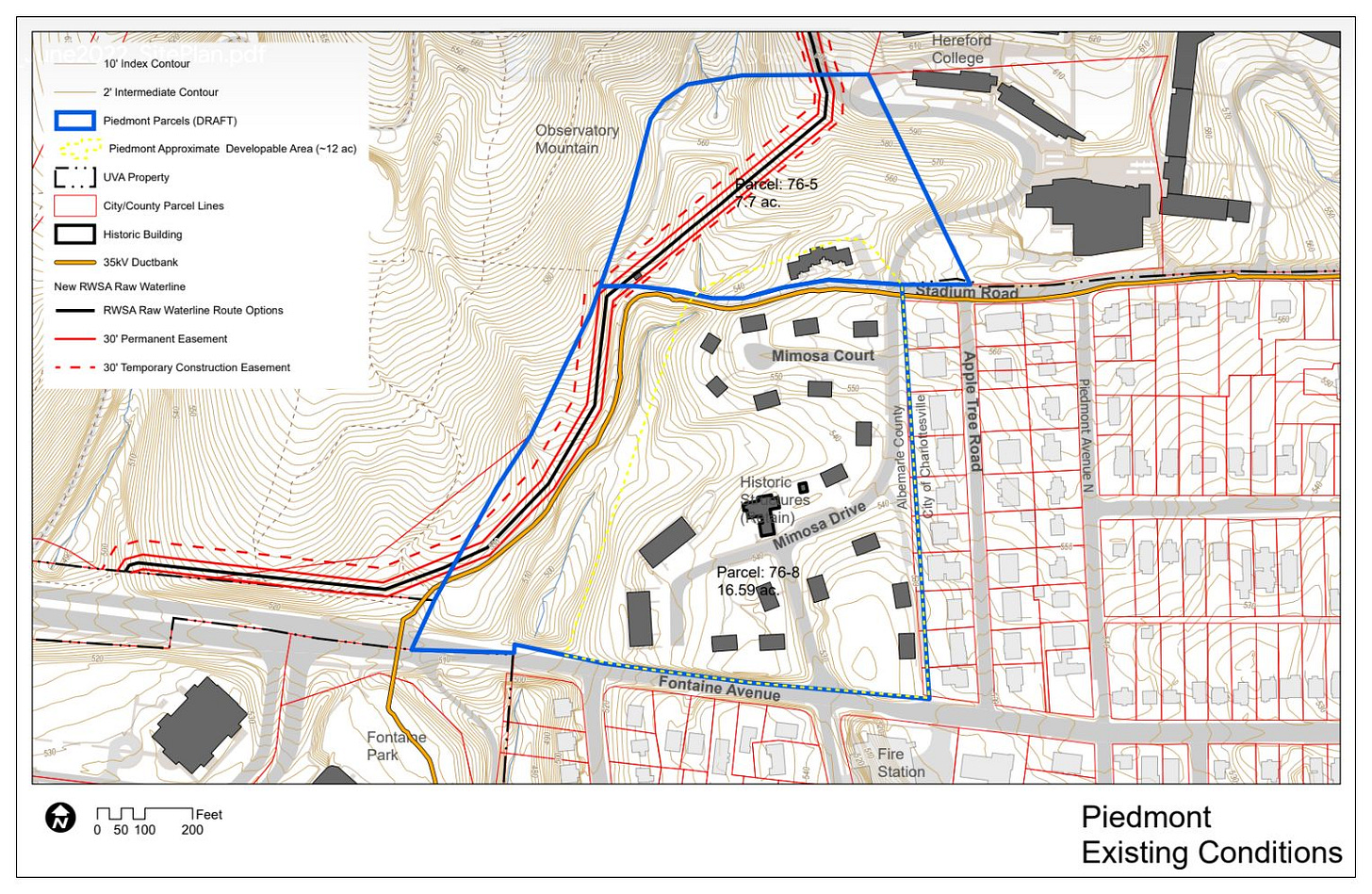
There will be no homeownership options at either site and the Foundation’s involvement will be limited to leasing the ground to the development team.
Existing tenants at the two locations are on year-to-year leases and have been informed of the potential redevelopment. Some but not all of the new tenants in the new buildings will be required to have specific low incomes.
“Our team’s analysis demonstrates a need for units at [30 percent to 60 percent of area median income], but it will be up to the development team to determine the best approach to maximize affordability while producing a financially feasible project,” reads the response to question 10.
The Foundation is also not stating a unit count at either location.
“The count should be identified by the selected development team’s development program and financial plan,” reads the response to question 14. “It is assumed that teams will seek to maximize the number of affordable units while working to offer a variety of affordability levels across the development.”
The response also clarifies that the units are not being targeted for UVA employees but for community members at the 30 percent to 60 percent level.
The UVA Foundation has previously offered land at the North Fork Discovery Park, but an RFQ for that project will not be issued until after a rezoning is completed.
See also:
UVA announces three sites for affordable housing projects, December 14, 2021
Places29-North committee gets first look at North Fork rezoning to add residential, March 3, 2022
University of Virginia issues first request for qualifications for affordable housing developers, June 10, 2022
Regional housing partnership endorses Piedmont Housing Alliance’s application to build affordable housing at two sites, July 7, 2022
Albemarle Supervisors approve nearly $3.3 million in additional funding for projects at Southwood
There’s a lot of demand for funding for housing projects across the community, and Albemarle County set aside some of its share of the American Rescue Plan Act to provide support to nonprofit agencies. The county asked those entities to apply for funding for affordable housing projects last gal
“During the [Agency Budget Review Team] and [American Rescue Plan Act] processes we received requests for more than $20 million in funding support,” said Stacy Pethia, Albemarle’s Housing Policy Manager.
On April 20, the Albemarle Board of Supervisors approved $1.29 million from the FY22 budget for three projects.
“That money went to the Albemarle Housing Improvement Program to preserve 41 affordable units,” Pethia said. “$625,000 went to the Piedmont Community Land Trust to create 12 permanently affordable new housing units. And $250,000 was awarded to expand the county’s current energy improvement program and that would extend that program for an additional 25 existing units.”
Another $2.7 million from Albemarle’s share of ARPA was set aside for housing, and Pethia said much of that went to the Premier Circle project being developed by Piedmont Housing Alliance, Virginia Supportive Housing, and the Thomas Jefferson Area Coalition for the Homeless.
On July 20, Supervisors were asked to approve funding for two additional projects.
“The staff is requesting the Board approve $3.3 million in funding [and] $3 million of that will be given to Piedmont Housing Alliance to support their Southwood Housing project and $306,000 will go to Habitat for Humanity to provide temporary rental assistance for 40 Southwood families that need to be relocated during the redevelopment process,” Pethia said.
That relocation will take place for two years as the second phase of Habitat’s Southwood redevelopment gets underway. The total project cost is $2 million, making the county’s cost about 15 percent of that total. Pethia said the relocation will be in a building being constructed as part of phase one.
Pethia said Piedmont Housing Alliance’s Southwood Apartments will have 121 units in the first phase of the Southwood redevelopment.
“Those units will serve households with incomes between 30 percent and 60 percent of the area median income,” Pethia said. “The total project cost is $24.9 million.”
Pethia said Albemarle’s total contribution for that project will end up around 12 percent of the total cost, or about $25,000 per unit. The main bulk of the funding comes from the sale of Low-Income Housing Tax Credits but other sources include the National Housing Trust Fund and the Virginia Housing Trust Fund. Albemarle’s Office of Housing will also dedicate eight vouchers to the project.
“That equals approximately $500,” Pethia said. “That will provide rental assistance to dedicated units for 15 years.”
Supervisor Ann Mallek asked what would happen after that 15 years. Pethia responded they would have to remain affordable for 30 years because that is the requirement under the Low Income Housing Tax Credits mechanism.
Supervisor Ned Gallaway said Supervisors have to have a discussion about the future of the county’s affordable housing trust.
“We’re on the 20th day of the Fiscal Year and our affordable housing fund, which we’ve taken probably four years to get up to $5 million is now down to under $500,000 again,” Gallaway said. “That’s not bad because we’re using it but there’s still so much out there that we need to do.”
Gallaway said the county needs to do more than rely on surpluses and one-time money.
Second shout-out: Join me for a Cvillepedia training session - Brand style
In today’s house-fueled public service announcement, the Albemarle Charlottesville Historical Society wants you to know about an upcoming exhibit at the Center at Belvedere featuring portraits of several historical figures active in the Charlottesville area in the 1970’s and 1980’s. Frances Brand was a folk artist who painted nearly 150 portraits of what she considered “firsts” including first Black Charlottesville Mayor Charles Barbour and Nancy O’Brien, the first woman to be Charlottesville Mayor. Brand’s work will be on display from July 5 to August 31 in the first public exhibit since 2004.
And, if you’d like to help conduct community research into who some of the portraits are, cvillepedia is looking for volunteers! I will be leading a Cvillepedia 101 training session at the Center August 1 at 2 p.m. Sign up at the Center’s website.
Another algae bloom at Chris Greene Lake
Albemarle County has closed the beach to people and animals at Chris Greene Lake due to another harmful algae bloom.
“People and dogs are prohibited from swimming in the lake until further notice,” reads a press release that went out on Wednesday. “Hiking trails and the dog park remain open, and boating is still permitted.:
This is the second such event in less than a year. Another harmful algae bloom shut down the water last October and Chris Greene Lake was reopened after tests showed reduced levels of the bacteria that cause the blooms to occur.
Another bloom in June 2018 prompted the county to hire the firm SOLitude Lake Management to conduct a study of the lake’s chemistry to understand the source. Their work found that organic material has accumulated at the bottom of the lake since it was created in the 1970’s. Lower oxygen in warmer months releases phosphorus into the lake upon which the algae feeds.
“Algae are naturally-occurring microscopic organisms that are found in fresh and salt waters of Virginia and around the world,” reads the Virginia Department of Health’s website on harmful algae blooms. “Most algal blooms are not harmful but some do affect fish and humans, as well as other animals like birds and marine mammals.”
Western portions of Lake Anna are also experiencing harmful algae blooms and an advisory was issued on July 15. The next report on that situation is expected on August 10.
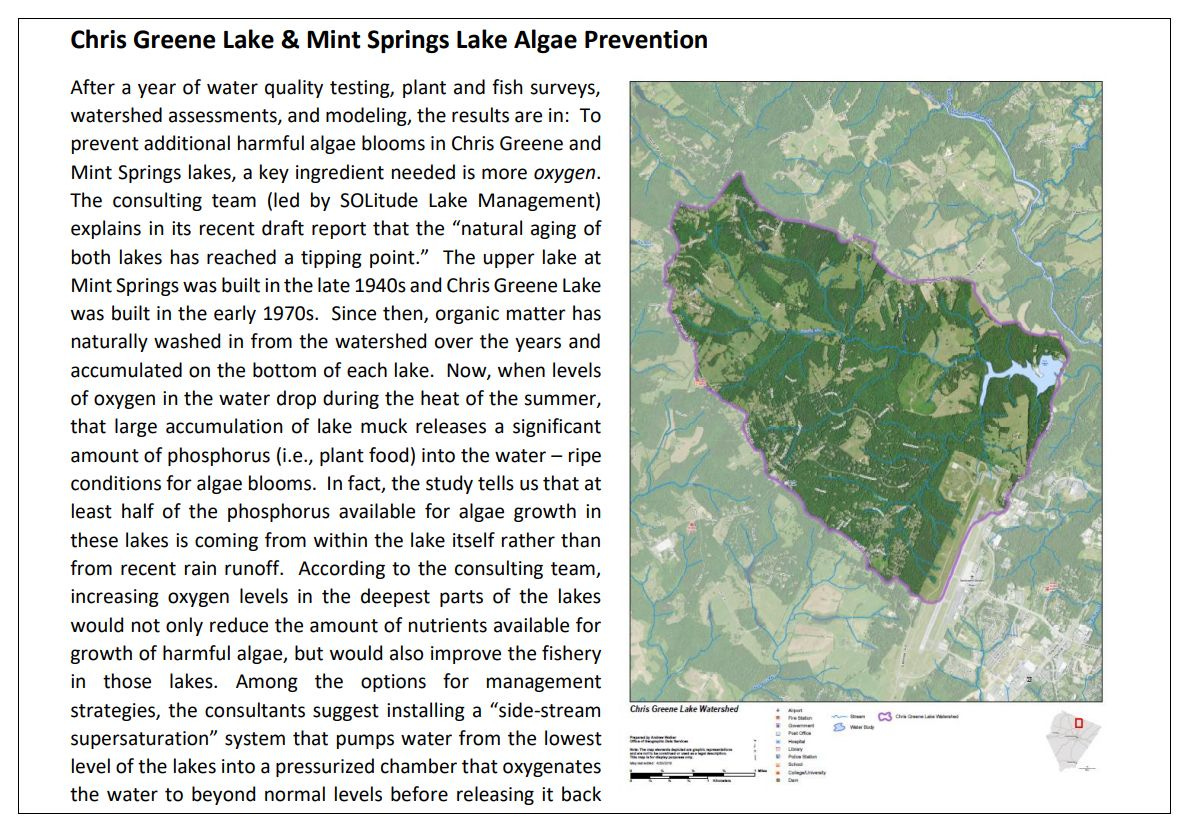
Albemarle Supervisors deny landowners request to be exempt from new rules on clean fill
The Albemarle County Board of Supervisors has taken action on the first test of an ordinance adopted in the fall of 2020 to regulate the practice of importing dirt from construction sites and other excavations to agriculturally zoned land.
“The fill regulations were developed to protect public health, safety, welfare, and those regulations were designed to limit the scale and impact on roads, the adjacent areas, noise, runoff,” said Bart Svoboda, the county’s zoning administrator.
The owner of two properties just to the west of Chris Greene Lake wants an exemption from all of those rules because he says they restrict a contract he has with the federal government to further develop forested land that was clear cut in 2009 that he now wants to become suitable for livestock pasture.
“I am currently working on a multiyear, federally-funded environmental quality incentive program to improve the overall agricultural production of a 254 acre farm that has been in my family since the 1730’s,” said Tim Kindrick.
The request is the first to come in since Supervisors adopted updated rules for what’s called clean fill on September 16, 2020. The new rules only allow imported fill on two acres per property.
About 90 acres of the property were clear cut in 2009 and the stumps were left to decompose in place in order to prevent erosion.
To move the land into productive use as pasture, Kindrick entered into a contract with the United States Department of Agriculture’s National Resources Conservation Service. One of the items in the meeting packet is a letter from Kory Kirkland with the NRCS. (read Kindrick’s application)
“I have been working with Tim Kindrick on a multiyear project to conserve, improve, and protect the natural resources on his farm. This project promotes improved pasture condition and use, permanent/ perennial vegetation, and some use exclusion on areas that are most vulnerable. Part of the project area includes the area that Mr. Kindrick has proposed to use clean fill dirt as a land treatment to improve existing [conditions] for continued/ improved agricultural use.”
Clean fill means solid matter brought from other sites that could include soil and other inert materials that change the topography of the landscape.
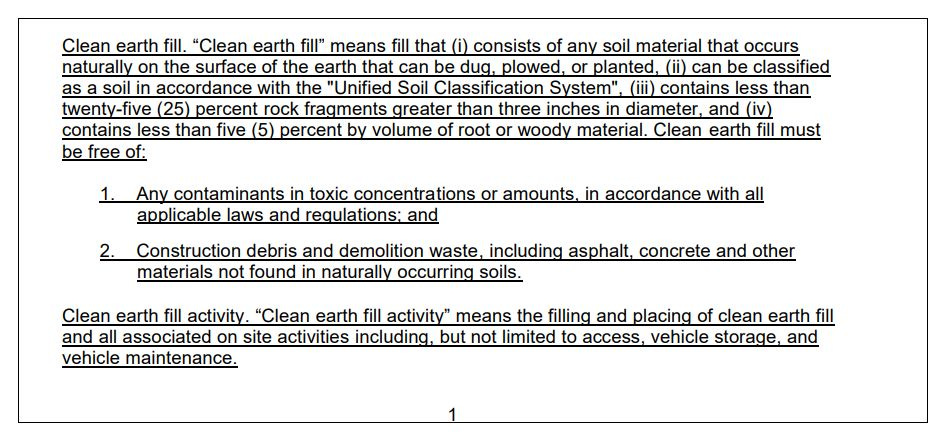
Kindrick told the Board of Supervisors the project is agricultural in nature and that the new rules should not apply due to the Virginia Right to Farm Act. He said he has been held hostage by the new ordinance.
Zoning administrator Bart Svoboda said staff does not see it that way. (county fill-dirt rules)
“Under our ordinance, the zoning ordinance, the activity is not agricultural,” Svoboda said. “Fill activity is specifically excluded as an agricultural activity under state code and local code.”
Svoboda acknowledged that the Virginia Right to Farm Act does restrict localities from regulating many agricultural uses, but clean fill brought in from external sites is not one of them.
“That activity of bringing fill from offsite is not an agricultural use,” Svoboda said. “It supports agriculture but under those definitions it is not agricultural use.”
Svoboda said staff recommended denial in part because there was no plan for how environmental effects would be mitigated under the plan.
Supervisor Jim Andrews questioned the request for exemption from all of the rules.
“My sense is that this is really an attempt to say that this regulation shouldn’t apply at all and asking us to make that determination which seems highly inappropriate,” Andrews said. “Without conditions I can’t understand what I’m really looking at.”
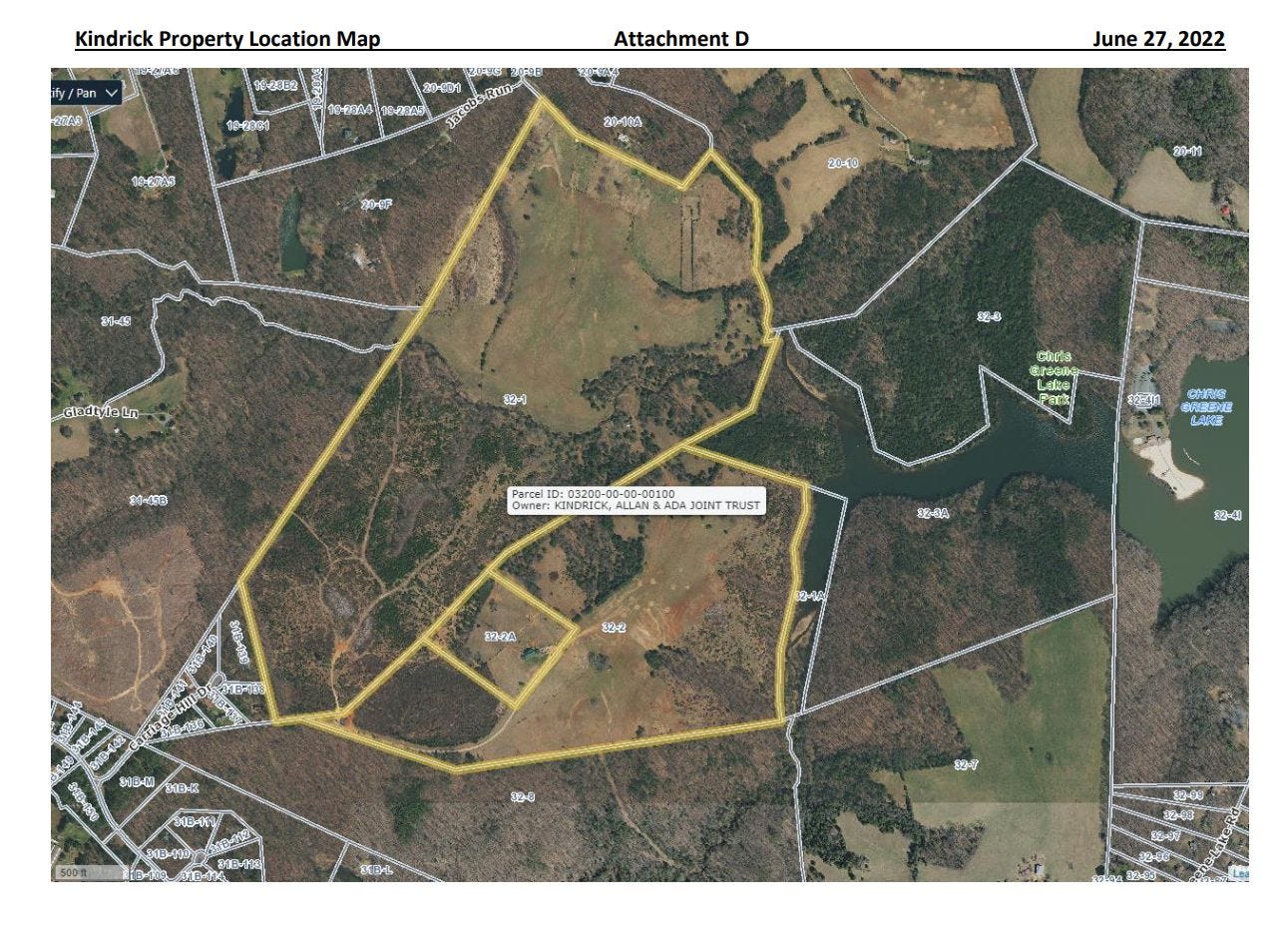
Before we get to the end of the story, we have to go back.
Earlier in the meeting, Brian McCay spoke on behalf of the Earlysville Forest Homeowners Association and said Supervisors should not grant the exemption.
“Earlysville Forest has a right of way easement with the Kindrick family that was signed when the neighborhood was first developed,” McCay said.
The neighborhood dates back to the 1980’s and McCay said the terms give the association an 15-foot easement intended for a driveway that links to Carriage Hill Drive.
“However that driveway is now being used as access for the fill dirt operation requiring repeated trips by heavy dump trucks and is not adequate for that purpose,” McCay said.
When asked by Supervisor Ned Gallaway to further explain the neighborhood’s opposition, McCay spoke a second time saying he was not opposed to the use of the property.
“Our opposition is directly to the use of this access by heavy equipment and we want to stop that basically,” McCay said.
Supervisor Donna Price said she toured the property with Kindrick and saw the installation of mechanisms to keep additional organic material from being washed into the watershed of Chris Greene Lake.
“I did have a tour of part of the property and I did see where livestock exclusion fencing has been constructed to protect the waterways,” Price said. “My concern here is that our ordinance may have someone created what I’d call the law of unintended consequences by limiting the soil to have to come from the farm itself.”
Price said the farm was in existence many years before the homes were built on Carriage Hill Road and that Kindrick had a legal right to use it.
“It is a farm,” Price said. ”A farm naturally engages in some sort of industrial use.”
Price asked for a legal perspective on whether the county’s ordinance was against state rules.
“As Mr. Svoboda said at the beginning, there’s a difference between agricultural use on the one hand and fill use on the other and as Mr. Svoboda also pointed out, there was a recent amendment to state law that specifically amended agricultural activity so as not to include imported fill,” said Deputy County Attorney Andy Herrick.
Supervisor Ann Mallek said the county’s new rules on clean fill were the subject of much public discussion over several years.
“I cannot support someone saying ‘I don’t want this law to apply to me,’ and I think we have to make a decision based on the information we have now and if there’s a future application that comes in with something different, that would be fair to the neighbors and to the process.”
Supervisor Ned Gallaway said he was sympathetic to the landowner, but the county put its ordinance into place for a reason.
“I think even then we knew that this would likely frustrate good actors coming forward but the regulations and the ordinance were put in place to stop the bad actors and the activity that we were concerned about,” Gallaway said.
There are six ways you can get a waiver but Kindrick wanted a blanket exemption from all of the rules. Gallaway suggested a new application that sought to justify the waiver.
Price said she also could not support a blanket exemption.
“But I really want county staff to do what I believe county staff does which is help this community member achieve within the law what he wants to do which is to improve the quality of his farm,” Price said.
The motion to deny the application for a special exemption was approved unanimously.
Housekeeping notes for episode 413:
And that’s it for another edition of Charlottesville Community Engagement, and you may have noticed a focus on Albemarle County. I’d been wanting to get some of these items out there and it took a bit. There’s so much going on and I hope to have another edition out Monday at noon.
Between now and then, there’s the Week Ahead coming out on Sunday. There will also be another look at what’s happening at government meetings in the Fifth District in the new Government Glance.
In a few days, the above stories will be on the Information Charlottesville website.
Want to read articles on land use at the University of Virginia? Click here!
What about information on local waterways? Click here!
How about economic development? Elections in Virginia? The archive grows each week!
All of this is supported by readers and listeners under the Town Crier Productions company I formed two years ago and am still learning how to operate. I’m breaking even, but I’d very much like to find a way to grow. There are ways to do that!
For one, if you sign up for a paid subscription through Substack, Ting will match your initial payment! And, if you sign up for their services through this link you’ll get a free standard install, your 2nd month free, and a $75 downtown mall gift card! Enter the promo code COMMUNITY for full effect.
Music on the podcast version of the show comes from the D.C. sensation Wraki, and you can support their work by paying whatever you want for the album on BandCamp.
My sincere hope today, though, is that someone will ponder the concept of elevators. And what would happen if they could predict the future?




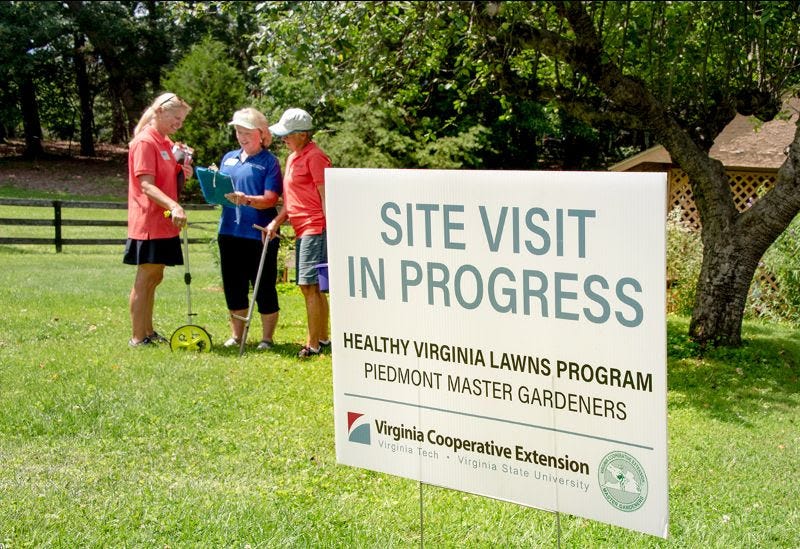











Share this post